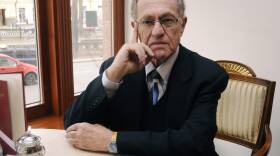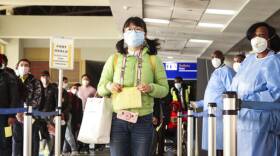EXPLORE MORE
Monday on BPR:
Former Boston Globe editor Brian McGrory
Food policy analyst Corby Kummer
Boston Medical Center’s Dr. Katherine Gergen Barnett & Beautiful Way Foundation's Tamika Jackson
Chef Ken Oringer
Recent segments
-
Cabral: Dershowitz Is 'A Harvard Professor Making A Trump University Argument'
On Wednesday, Dershowitz said that advanced a controversial legal theory in which he claimed a president could invite electoral interference from a foreign power to aid them because it would be in the public interest. -
Chuck Todd: Dershowitz Is Arguing A 'Legal Theory For One' Person
Trump defense attorney Alan Dershowitz argued in the impeachment trial the president is allowed to engage in a quid pro quo. -
The Story Of Aaron Hernandez Is An 'American Tragedy' Says Sue O'Connell
What would the former Patriots player and convicted murderer have been like without football brain injuries? -
Juliette Kayyem: The Trump Administration Isn't Prepared For The Coronavirus
Yes, we should be focusing on the flu, but we should also be wary of just how unprepared we are for an outbreak in America. -
Leung: Harvard Scientist Scandal Raises Questions About The School's Ability To Protect Itself From Infiltration
On Tuesday, US Attorney for Massachusetts Andrew Lelling charged the chairman of Harvard University’s department of chemistry and chemical biology, Charles Lieber, with lying about his connections to a Chinese university. -
Medical Record Company Is 'Wrong, Wrong, Wrong' To Block Data Sharing, Says Art Caplan
Epic is being critiqued for not making its medical data easier to be shared between doctors and patients.
Listen to previous shows
-

Paul Reville Calls For 'Flexibility' From Teachers Unions, Management Over School Reopenings
Massachusetts’ largest teachers unions strategy for urging fully remote learning in the state this fall hit a snag when a teacher strike in Andover was ruled illegal by the state’s labor board, after the union instructed teachers not to enter school buildings for a staff training last week. Paul Reville told Boston Public Radio on Thursday he agreed with the labor board’s decision, though acknowledged that there is no unified front on either side of the issue. “There’s a lot of tension now between the unions’ understandable and justifiable role in protecting their members’ health and interests, and school districts pushing hard to reopen school, with a lot of parents feeling they want to see their children back in school,” he said. State law prohibits public employees from striking, and the labor relations board determined that the union overstepped its authority when it tried to unilaterally dictate where teachers perform their work. “I’m looking, I know a number of people are looking for flexibility, both from management and labor, in getting to a set of agreements that takes into account the needs of children and families in this moment,” he said. The ruling comes as a number of districts are still negotiating how to start school this fall. Reville is former Secretary of Education and a professor at Harvard University’s Graduate School of Education where he also runs the Education Redesign Lab. His latest book, co-authored with Elaine Weiss, is “Broader, Bolder, Better: How Schools and Communities Help Students Overcome the Disadvantages of Poverty.” -

BPR Full Show 9/9/20: Warped
Today on Boston Public Radio: MIT economist and Affordable Care Act architect Jonathan Gruber discussed concerns that a rushed COVID-19 vaccine could exacerbate vaccine skepticism in the U.S., and other political quandaries surrounding Operation Warp Speed. We opened lines to ask listeners: what would it take to get you on board with an American-made coronavirus vaccine? CNN’s Brian Stelter discussed his latest book, "Hoax: Donald Trump, Fox News, and the Dangerous Distortion of Truth.” National security expert and CNN analyst Juliette Kayyem discussed controversial acknowledgments made by the president in a forthcoming book from veteran journalist Bob Woodward, and her latest piece in The Atlantic, called "The Emotionally Challenging Next Phase of the Pandemic." Medical ethicist Art Caplan weighed in on the thousands of Americans attending Donald Trump rallies without masks, and ethical questions raised by a new drug claiming to treat a common form of dwarfism. Food writer Corby Kummer discussed data from the Massachusetts Restaurant Association indicating that 20% of Mass. restaurants have closed permanently because of the COVID-19 pandemic, and thoughts on fellow food writer Tom Philpott’s new book, “Perilous Bounty: The Looming Collapse of American Farming and How We Can Prevent It." We opened lines to ask listeners: are you ready to continue eating outside at restaurants during the fall and winter? -

Kayyem Weighs in on ‘Deadly Interesting’ Revelations from Bob Woodward’s ‘Rage’
National security expert Juliette Kayyem made her weekly appearance on Boston Public Radio Wednesday, where she touched on reporting from veteran journalist Bob Woodward’s forthcoming book, “Rage,” which includes an acknowledgment from President Trump that he understood the looming severity of the COVID-19 pandemic back in February, at the same time he was publicly claiming the virus would “disappear." "Trump never likes to be wrong,” she said. "And so what was interesting to me about his claim that he always knew how bad it was going to be, is that even though it’s against self-interest… in some ways it satisfies his own narrative about himself, which is ‘I’m never wrong.’" "I think that that’s so interesting… deadly interesting, that that’s how his brain actually works,” she said. “He’d rather be accused of lying than be accused of being wrong." Kayyem also discussed her latest piece in The Atlantic, "The Emotionally Challenging Next Phase of the Pandemic," and whether she believes the president's latest string of scandals will influence swing voters in November. Kayyem is an analyst for CNN, former assistant secretary for the Department of Homeland Security, and faculty chair of the homeland security program at the Harvard's Kennedy School of Government. -

Corby Kummer Warns More Restaurants 'Will Die’ Without Dramatic Action
Food writer Corby Kummer joined Boston Public Radio on Wednesday, where he discussed new data from the Massachusetts Restaurant Association indicating the state has already lost a fifth of its restaurants to revenue losses resulting from the COVID-19 pandemic. Kummer warned that while the numbers are tragic, this forthcoming winter season could prove even grimmer for Mass. restaurants. "Until Spring… we’re not going to have an accurate count, an accurate figure – and I think that’s the news we’re going to be bracing for,” he said. “Many restaurants this winter, unless something changes dramatically, will die." During the interview, Kummer also touched on his recent New York Times review of Tom Philpott’s “Perilous Bounty: The Looming Collapse of American Farming and How We Can Prevent It,” and an NPR report about the alarming percentage of low-income kids not getting government-subsidized meals through the pandemic. Kummer is a senior editor at The Atlantic, an award-winning food writer, and a senior lecturer at the Tufts Friedman School of Nutrition and Policy. -

Caplan: Vaccine Trials Cannot Be Rushed, Regardless Of Political Pressure
The pharmaceutical company AstraZeneca has halted the late stage trial for a COVID-19 vaccine this week due to a suspected adverse reaction in a participant. Medical ethicist Arthur Caplan told Boston Public Radio on Wednesday the participant developed an inflammation of the spinal cord and had to be hospitalized, causing the company to pause the trial in order to conduct a safety review and determine whether the reaction was in fact caused by the vaccine. Caplan said the takeaway from this latest development is that medical trials cannot be rushed, no matter the political pressure to quickly develop a vaccine. “We want to vaccinate our way out of this thing and people keep spinning tales it’ll be here in October,” he said. “I keep saying no it wont, it’ll be here next year, and I don’t know when, but maybe the end of the year … because you’ve got to collect this data.” Art Caplan is the Drs. William F. and Virginia Connolly Mitty chair and the director of the division of medical ethics at the NYU Grossman School of Medicine.









